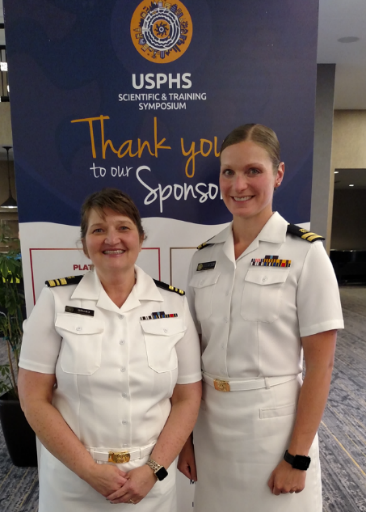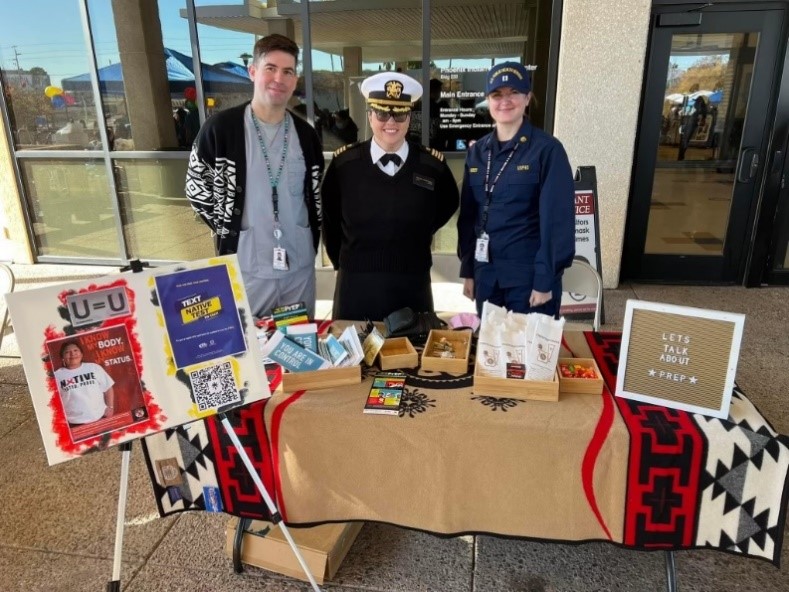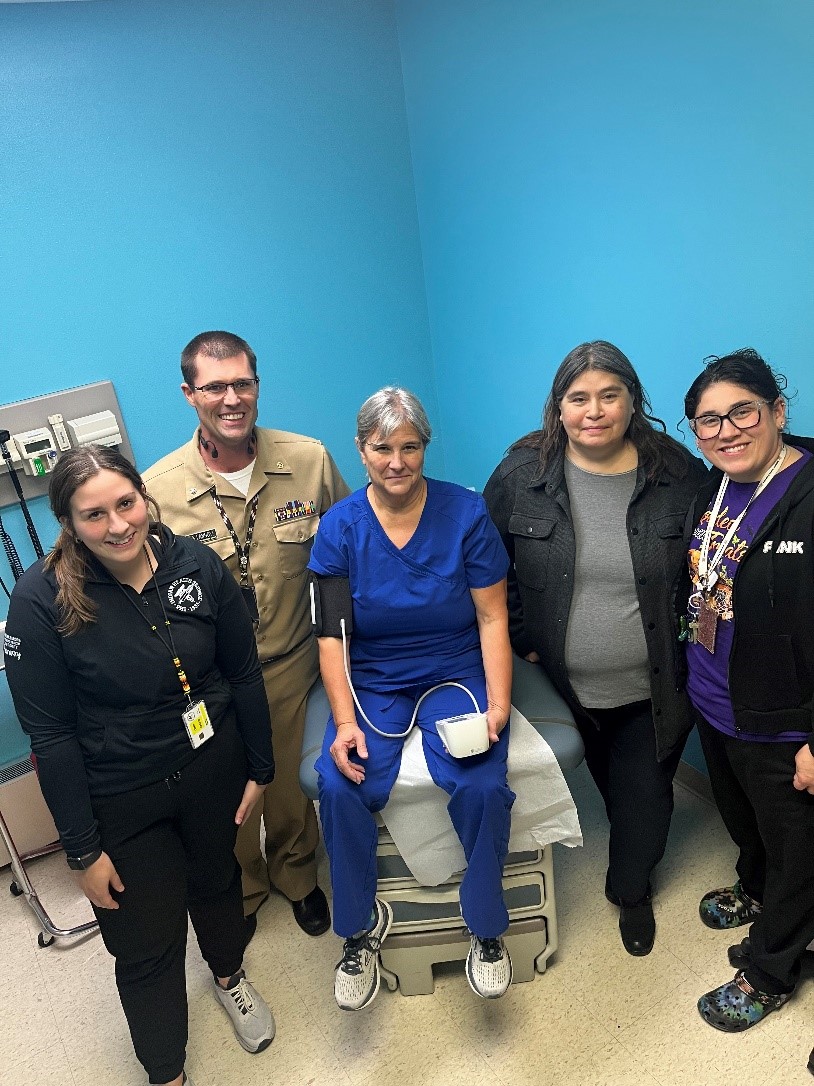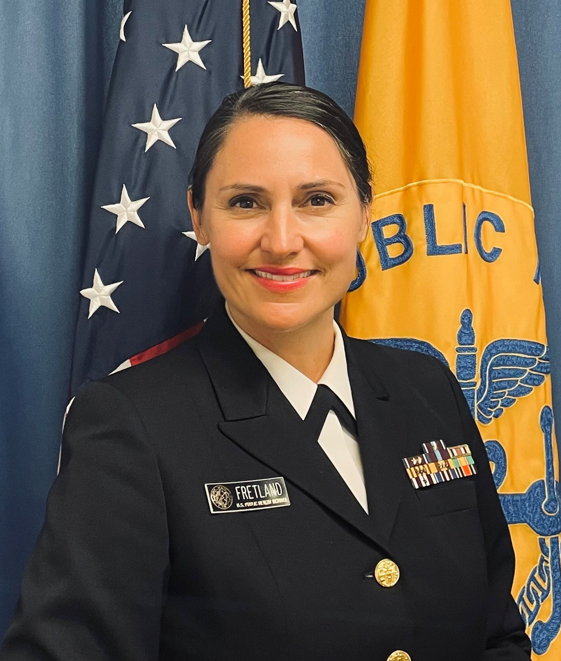October is a special month dedicated to celebrating the remarkable contributions of pharmacists, pharmacy technicians, students, and aides who play a crucial role in enhancing the health and well-being of our communities and the patients we serve. The Indian Health Service pharmacy team has a long history of developing clinical pharmacy services to meet the needs of our patients. Throughout the United States, pharmacists continue to be the most accessible and trusted health care providers. In the IHS, our pharmacists and pharmacy teams continue to exemplify this trust by delivering patient-centered pharmacy care through strong relationships and innovative pharmacy practices. A few great examples of their work are below.
Red Lake Service Unit – Pharmacy Behavioral Health Clinic – IHS Bemidji Area
The clinical pharmacists at Red Lake Hospital in Minnesota have strived to improve patient care and clinical outcomes for a variety of chronic disease states through a pharmacy primary care clinic model. In 2015, they noted that underlying mental health conditions were creating barriers to the patient self-care behaviors needed to achieve chronic care goals. This illustrated a need to integrate behavioral health services into primary care. Three primary care pharmacists responded to this need by completing a mental health workforce training program to manage pharmacologic therapy for disorders such as depression, anxiety, and post-traumatic stress disorder. In recent years, they expanded their focus to include substance use disorders, and now employ their skills to meet patients where they are at. They provide comprehensive care by ordering and interpreting labs, adjusting non-controlled psychotropic medications, initiating and maintaining substance use disorder treatments, and completing suicide assessments and safety plans as privileged members of the medical staff.
The deployment of pharmacy-delivered behavioral health services has addressed a number of unmet needs by increasing access to care and empowering patients to identify their own goals. In 2020, they were able to increase the number of pharmacy behavioral health clinic visits by more than 130%, while increasing emergency department visits utilizing medication-assisted treatment by 600%. Today, the program continues to grow, with providers striving to reduce harm and promote wellness through comprehensive care.

Red Lake Behavioral Health Pharmacists Cmdr. Teresa Grund and Cmdr. Samantha Gustafson
Phoenix Indian Medical Center – Pharmacy HIV and Hepatitis C Program – IHS Phoenix Area
The first dedicated HIV pharmacist position within IHS was established in 2005 at the Phoenix Indian Medical Center. A permanent part-time HIV pharmacist position was established to provide pharmaceutical care while focusing on cost containment for antiretroviral medications. Utilization of alternate resources justified the position resulting in a cost savings of $500,000 the first year, and now more than $7 million annually. This model led to multiple positions being established across IHS, not only in HIV, but also in other disease states with high medication costs like oncology, rheumatology, and hepatitis C.
HIV pharmacy has now evolved into a provider extender, pharmacist provider role, expanding into rapid new starts for HIV and HIV prevention, with the pharmacist initiating therapy. The future of HIV pharmacy is HIV prevention, and now that oral prevention meds are generic and more cost-effective, pharmacists are poised to take on a larger role in HIV prevention. For the pharmacists working with patients that are living with HIV or at risk for HIV, one of the most fulfilling parts is providing the support they may not have anywhere else in their lives. These interactions of support build trust and result in a pharmacist-patient relationship that will impact their success for years.
In 2015, PIMC identified the need for a hepatitis C virus team to focus on patients that had never been treated. The availability of HCV treatments with a higher success rate and fewer side effects made treating HCV a reality. At PIMC, a three-person team started in 2016 and a clinical HCV pharmacist was part of that team. The pharmacist focused on ensuring that all labs needed prior to initiation were drawn and would help in the interpretation to make sure the correct medication was selected based on genotype and existing liver damage. The pharmacist provided cost containment and alternate resource utilization for these medications that initially cost $30,000 for a course of treatment with very little insurance coverage. Although PIMC uses the team model, it is becoming more common across IHS for a pharmacist to completely manage HCV treatment with the assistance and support of Indian Country ECHO.

Adam Gurnoe, Capt. Heather Huentelman, and Lt. Amanda Huber at the Phoenix Indian Health Center Health Fair and Market, 2022
Warm Springs – Pharmacy Contraception Care – IHS Portland Area
Clinical pharmacists at the Warm Springs Health and Wellness Center in Oregon have been providing contraceptive care to patients through a collaborative practice agreement since 2017. Through this CPA, pharmacists are authorized to provide screenings, check vital signs, and order and evaluate labs. They provide a comprehensive consultation for the patient, assessing patient past experiences, personal preferences, and reproductive plans. The patient and pharmacist then use collaborative decision making to select a contraceptive method, for which the pharmacist enters a prescription. If a patient prefers a contraceptive option that requires a medical visit (implant, intrauterine device, intramuscular medroxyprogesterone), the pharmacist assists the patient to get a medical visit, and provides a prescription for a different form of contraception to bridge the patient to the medical appointment. Pharmacists provide a prescription with refills for a year, but follow up is scheduled at both a month and at three months, to check in on patient satisfaction with their medication and assess for adverse drug reactions. The current pharmacy care clinic model has shifted since the inception of the contraceptive clinic, and is now part of a more comprehensive CPA that allows the pharmacist to address other concerns at the same visit, including tobacco cessation, alcohol abstinence, hypertension, diabetes, and cardiovascular risk reduction. Immunizations are also offered when appropriate.
Quentin N. Burdick Memorial Healthcare Facility – Pharmacy Primary Care – IHS Great Plains Area
The Quentin N. Burdick Memorial Healthcare Facility in Belcourt, North Dakota, has 14 pharmacists who are credentialed/privileged to provide pharmacy-based clinics for anticoagulation, asthma/COPD, type 2 diabetes mellitus, HCV, hypertension, hyperlipidemia, tobacco cessation, over the counter, and medication for opioid use disorder. Within the first five months of their hypertension initiatives, which included implementation of home blood pressure monitors, patients who met the Million Heart GPRA measure increased by 21% and the controlled hypertension measure in patients with diabetes increased by 16%. During these visits, pharmacists provided education regarding comorbidities related to hypertension, which improved their tobacco cessation rates as well as hemoglobin A1c.
Over the last year, pharmacy staff have identified patients for pharmacy clinical services based on population health needs, and pharmacy clinic visits have increased from 998 visits (averaging 83 per month) in Fiscal Year 2022 to 1788 visits (averaging 163 per month) in FY 2023. With the implementation of new services and patient recruitment, there has been significant improvement in facility GPRA goals, specifically those related to hypertension and type 2 diabetes mellitus. Both patient and provider satisfaction have increased as patients have greater access to care and chronic disease state management. The pharmacy staff at Quentin N. Burdick have optimized collaborative care models by addressing access issues and adapting to community needs, which have ultimately improved patient outcomes.

(Left to Right) Karly Westra, PharmD; Cmdr. Tyler Lannoye, PharmD; Laurel Langan, RN; Paula Bercier, MD; and Rhea Decoteau, PhD, RN, CDCES



